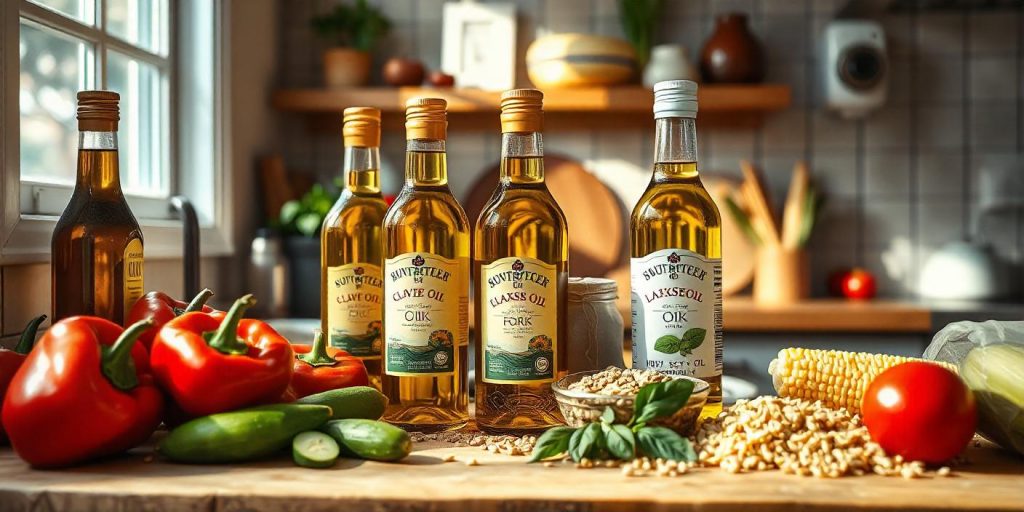Almost every family’s grocery list, every chef’s menu, and nearly all recipes have oil as a primary ingredient. Oil marries meat, brings out flavour and depth in baked or sautéed vegetables, and dresses summer salads correctly—no half-hearted vinaigrettes here. For most of us, oils are a perfectly healthy part of the overall diet. But what kinds of oil are we using, and are they fit for our taste buds and nutritional needs?
Seed oils are being looked at very closely, especially as a potential source of ill health or harm. But here’s the rub: There’s no bad food, only one that partakes of many factors that sometimes make it a poor choice. There’s no reason to shun seed oils; in moderation (as well as in your oil-picking context), they can serve your health quite well. Here’s the what, the what-for, and the how-to of seed oils in the diet.
What are oils derived from seeds?
Plant oils usually come from the fruit, but seed oils come from the seeds of certain plants. Extraction methods differ. One way to extract the oil uses heat and pressure; another method—deemed more natural by many people—involves pressing the seeds at lower temperatures. Both methods work, with different end products, and have been used throughout history.
Typical seed oils are obtained from seeds such as canola, corn, sunflower, pumpkin, chia, and sesame. Peanuts also yield an oil that is quite popular.
Practical, delicious, and user-friendly, seed oils are the go-to culinary fats. They work well in almost every cooking application, and because most have a high smoke point, they are excellent for high-heat methods like frying or sautéing. Seed oils also come in various flavours, from the punchy, toasty essence of toasted sesame oil to the very neutral profile of safflower oil. In between, many options could be categorized as “seed oil.” For this piece, though, we’re sticking with oils from seeds widely adopted in American kitchens.
In conclusion, while seed oils are usually inexpensive, certain specialty seed oils—like those from chia seeds or sesame—can be costly.
Are seed oils harmful to your health?
Understanding seed oils and their place in your diet requires understanding fats and how they affect the body. Like all oils, seed oils supply dietary fat—a nutrient essential for the absorption of specific vitamins and the formation and functioning of our cells. “All fats and oils are a mixture of saturated and unsaturated fatty acids,” But these two types of fat behave quite differently in our bodies.
Foods high in saturated fats—such as meat, dairy, and coconut oil—can raise levels of both types of cholesterol. However, saturated fat usually raises the “bad” cholesterol (LDL). It’s linked to an increased risk of heart disease. Some studies even suggest a connection between saturated fat, cholesterol, and Alzheimer’s disease. For that reason, it’s a good idea to limit your intake of foods high in saturated fat and replace them with other types of fat that benefit your heart and brain.
In contrast, unsaturated fats are a healthier choice for most individuals. Two varieties exist—monounsaturated and polyunsaturated fats. Research indicates that monounsaturated fats, which come chiefly from plants, might lower levels of lipoprotein cholesterol that are associated with cardiovascular disease, raise levels of lipoprotein cholesterol that are associated with protection from cardiovascular disease, and regulate blood sugar more effectively than the typical American diet.
The key point is that several oils from plants and seeds are predominantly composed of “good,” unsaturated fats and, thanks to their composition, are cardiovascular protective. There might even be a couple of added benefits to using chia seed oil as an ingredient. For one, the oil from the tiny nutrient-dense seed might support immunity in ways its more conventional cousins do not. Second, chia seed oil, as well as other seed oils, might be helpful in maintaining eye health. Finally, a few studies have hinted that chia seed oil might be ant proliferative (i.e., it might inhibit cancer growth).
It’s crucial to remember that numerous processed, pre-packaged foods contain seed oils—what’s sometimes behind the notion that seed oils are unhealthy. “We know that diets high in processed foods are linked to poorer health outcomes. Seed oil is not likely to cause adverse health effects. These processed foods also tend to have higher levels of refined carbohydrates, salt, and sugar; all things we know in excess can impact health negatively.
Foods that undergo extensive processing — such as certain breakfast cereals, baked goods, and chips — appear to increase the risk of some of the most serious health conditions. They seem to be linked to a greater likelihood of being diagnosed with cancer and a few other dire illnesses.
Incorporating seed oils into a nutritious dietary regimen
The secret to seed oil and countless other foods is moderation. The optimal way to incorporate seed oils into your life is to consume them mindfully and avoid eating too many processed foods. When you do use seed oils, consider them an “eat this” alternative to “don’t eat this” foods: Instead of using butter or coconut oil, sauté or bake with a seed oil. Salads are also a good opportunity to consume nutrients from seeds. Sunflower seeds, for instance, are a delicious and plentiful source of vitamins E and B, magnesium, and copper.
Remember that your health won’t rise or fall based on food consumption. Instead, it results from your overall dietary pattern. Following the nutritional guidelines put forth by health authorities can undoubtedly lead to you being healthier.
These guidelines may seem boring because they always relate to the same stuff. It’s whole foods dietary patterns for the win! When in doubt, eat food as close to its original form as possible. When not in doubt, also do this! In other words, make a massive effort to eat non-processed foods most of the time.
Eliminate distractions at mealtime. Substitute water or tea for sweetened beverages or soft drinks. Up the ante on vegetables, fruits, and whole grains. And it’s perfectly fine to savor your favorite not-so-healthy foods in moderation. If you’re struggling to figure it all out and are not entirely living a standard nutrition life, it could be because of a unique medical situation or a lifestyle that makes standard nutrition advice inapplicable. You should see a dietitian or your healthcare team if that’s the case.

